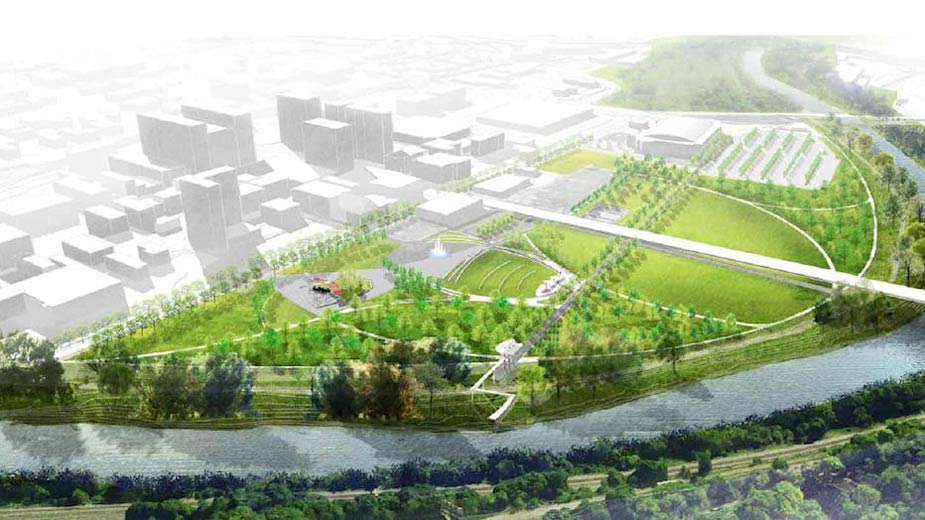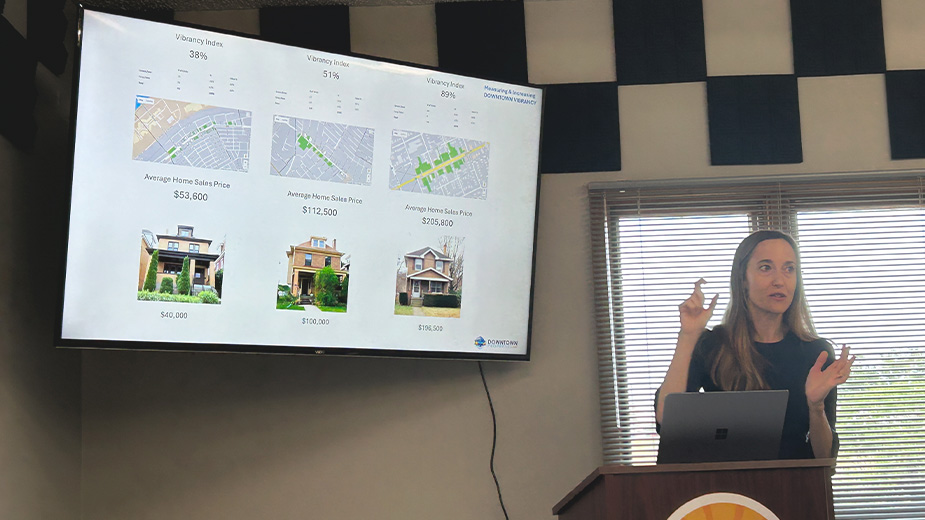Absence of Amphitheater Financials Raises Concerns
YOUNGSTOWN, Ohio – Individuals at last night’s public meeting about a proposed loan to help pay for the $9 million downtown amphitheater/riverfront park appeared supportive of the project, although some raised questions about financing it.
More than 50 people attended the session, held at the Covelli Centre and led by Bill D’Avignon, Youngstown director of community development.
The meeting was required because the city wants to take out a $4 million Section 108 loan to help pay for the project. The loan, from the U.S. Department of Housing and Urban Development, requires an amendment to the city’s 2016-2017 annual action plan with HUD.
Youngstown would repay the loan from future community development block grant funds, an estimated $260,000 per year for 20 years, or $6.6 million, D’Avignon said.
Making the riverfront green and building the amphitheater would enhance the activity in the downtown, he said. “The Covelli Centre in and of itself has been a great economic engine. This just builds on that process,” he stated. “It’s a very important project for the city.”
The city has taken out several Section 108 loans in the past, he reported. The most recent, due to be paid off in August 2019, was a $1 million loan to provide assistance to low- and moderate-income homeowners to make repairs to their houses, he said.
Another $4 million was borrowed to allow the Youngstown Central Area Community Improvement Corp. to purchase downtown buildings, some of which were torn down to build new ones, others to be redeveloped. Other loans were taken out to help companies such as Exal Corp., which now employs 700 people in the city, and the plant now operated by GLI Pool Products.
“Those businesses repaid those back,” D’Avignon said.
Although the focus of the meeting was on securing the loan, the CDA director said he would accept questions about other aspects of the project and relay the issues raised to the McNally administration.
Among the questions raised – by resident Chris Travers — is whether the Trump administration might affect future HUD funding.
The Washington Post reported that the Trump administration is seeking to reduce the HUD budget by more than $6 billion, which would reduce public housing support and could end community development grants.
“That’s speculation right now,” D’Avignon said. In the previous administration, President Obama regularly proposed additional spending for CDBG and other programs. “Congress always left that out,” he continued. “I would expect something similar to happen here — hopefully.”
Sharon Letson, director of Youngstown CityScape, asked about the absence of financial projections for the amphitheater.
“Somebody has to be doing some kind of numbers to figure out whether this makes sense,” she said. “Having said that, have they thought about the projected revenues to pay down these numbers, not to affect so much CDBG funding, which affects a number of organizations that receive that funding?”
Nobody looks at doing such a project – “and it’s a wonderful project” – without such projections, she added.
“I can’t understand how we would justify borrowing millions of dollars without having any type of projected revenue for the project,” said Michelle Fleming of Youngstown, who also said she liked the concept. “Unless there’s something that says this is going to improve our environment, change mentality or decrease violence, I can’t see why we’d spend that kind of money without projected revenues.”
After the meeting, Bob Vargo of Youngstown, a former booker for performance venues, said he was satisfied with what he heard regarding the financials for the project, which he predicted would draw from throughout the five-county region and beyond.
He also expressed his support for Eric Ryan, executive director of the Covelli Centre, which operates next to the site of the proposed amphitheater and park, to manage the new venue as well.
“You cannot let that out to another party because you’ll have built-in conflicts there,” Vargo said, not only in terms of bookings for shows but for parking. “If [Ryan is] involved, I’m really comfortable with it,” he said.
Ryan, who has informally consulted with the city on the project, said he believes the amphitheater and park should do 40 to 50 events – a mix of nonprofit and for-profit events such as concerts. “It can be up to 80 events, depending on how many community kind of events we do,” he said.
What Ryan heard from residents is they want the new development to have more of a community aspect, something often difficult to do with the Covelli Centre because of factors such as its operating expenses and the need to change how it is set up depending on the issue.
“The great thing about the amphitheater would be that you can wake up every day and we’re going to be the amphitheater. We’re not a rodeo today, a concert tomorrow,” he said.
4th Ward Councilman Mike Ray said the city will look at who will be ‘the best fit” to operate the amphitheater, which has long been envisioned as a companion to the Covelli Center. He also noted the “good track record” of Ryan and his company, JAC Management, operating the city-owned arena.
“This is something new and it took time to get the Covelli Centre right,” he said. In its early months, the arena was operated by an out-of-town management company and was unprofitable. “We will find what works,” he said.
Basia Adamczak, 7th Ward councilwoman, said she appreciated the input and that residents raised “very legitimate concerns” during the meeting.
“At the end of the day, we are trying to make the city better for them,” she said, “so any type of concerns that they have we definitely want to hear those and address them.”
She also noted that beyond meetings such as last night’s, more detailed discussions concerning the financials and how the amphitheater would be run are held during council’s finance and economic development committees, which are open to the public.
Issues discussed at those meetings have included naming rights and other sponsorship opportunities, she said. The city has projected that sales of such rights could generate $3 million, which council could use to pay down debt.
Pictured: Rendering of the project.
Copyright 2024 The Business Journal, Youngstown, Ohio.



